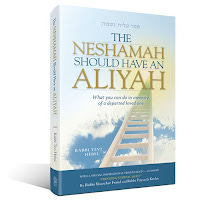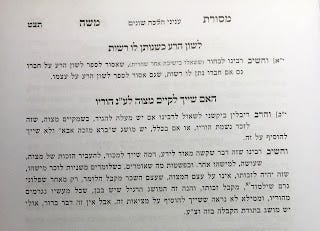BOOYAH!!!

Booyah!!! Or, to use the more traditional terminology, Baruch shekivanti.
I'm feeling pretty proud of myself, due to two things that happened.
First was regarding the article that I published in England's Jewish Chronicle, in which I criticized those who were condemning Israel's action on the Gaza border. My particular target was an article by Daniel Sugarman which had appeared in that newspaper the previous day. Several people had said that I was wasting my time writing such things, since Israel-haters are not going to be swayed by any arguments. But I felt that some people criticizing Israel were not haters, but simply misinformed and ignorant of the situation. Well, today, Daniel Sugarman retracted and apologized, citing the arguments that I had made as one of his reasons! This shows that it is indeed worthwhile putting in effort to publicly defend Israel.

The second thing that happened relates to a topic that I have been busy with for some time. A few years ago, I grew suspicious of the popular notion that you can learn Torah l'iluy nishmas whoever you name, and transfer spiritual benefit to them. It seemed to me that there was no framework for such a notion in classical Judaism, which only allowed for this to work for one's ancestors and teachers. In an article that I published on this topic, What Can One Do For Someone Who Has Passed Away?, I posited that organizations such as Chevra Lomdei Mishnah, and books such as The Neshamah Should Have An Aliyah, were distorting the true picture, notwithstanding their marketing themselves as Torah scholars.
Of course, there were people who dismissed this as typical Slifkin apikorsus. And even I myself was wondering why nobody else was pointing this out. (Although I did suspect that this was because this fabricated concept is an excellent source of income for yeshivas and kollels.)
Then a friend told me that when he was studying in the yeshivah of the famous Rav Tzvi Kushlefsky in Jerusalem, a student once asked if Rav Kushlevsky could dedicate that day’s lecture to elevate the soul of his grandmother. Rav Kushlevsky replied that this was impossible; while his delivering the lecture would be a credit to his own grandmother, there was simply no way by which to transfer that credit to someone else’s grandmother, who had no role in enabling the lecture to take place.
Yesterday, something else came to light. Reader Yonason Rosman showed me that yet another distinguished rabbinic authority stated this - none other than Rav Moshe Feinstein, ztz"l! Here is the quote, from Mesoras Moshe, a work compiled by his grandson and reviewed by R. Shmuel Fuerst:
Rabbi Rivlin requested that I ask our Rabbi if there is an advantage to declare, when fulfilling a mitzvah, that the mitzvah is in memory of the soul of one's parents, or if there is indeed any such notion of expanding upon the principle that "a son provides merit for his father."
And our Rabbi responded that this is a very difficult thing to know. For how is it relevant to sell, to transfer the merit for a mitzvah that one does, to someone else? And simply speaking, that which we say, when learning Mishnayos in memory of someone, that it is for their merit, does not refer to the actual [reward for the] mitzvah, for the actual reward is received by the one doing the studying. Rather, it is that since this [deceased] person is the cause that this person is studying, then he receives credit for it. And this is the standard concept which exists with a child, that all his deeds are the consequence of his parents - and thus it does not appear possible to add to this reality. But this is not a clear matter - perhaps there is a concept within Kabbalah regarding this, and it requires further investigation.
In other words, there is no such thing as doing a mitzvah on behalf of someone else. The most that you can say is that if the person is the cause of your doing a mitzvah - such as with a parent, who is the cause of your existence and education - then they receive credit for being the cause. Beyond that, there is no way to transfer the reward or credit for a mitzvah to somebody else. Unless there is some sort of unknown kabbalistic concept - which would go against normative rabbinic and logical thought.
It's nice to see that other people have reached the same conclusion as me. But don't expect to see this quote from Rav Moshe Feinstein appear on the website of Chevra Lomdei Mishnah, or in the next edition of The Neshamah Should Have An Aliyah. It's not good for business.
Meanwhile, the lesson is, strive for truth, and when you have sufficient reason to think you've found it, don't be afraid to say so - and if you have indeed discovered the truth, then you're probably not the first to do so!



